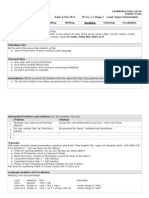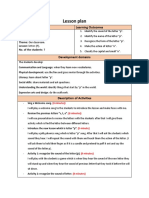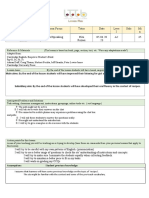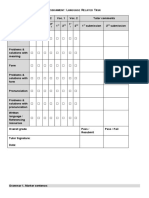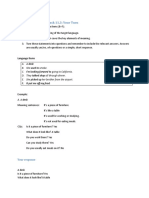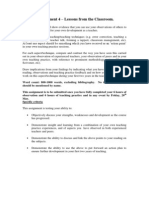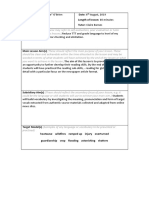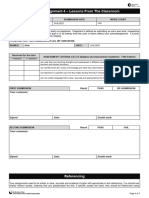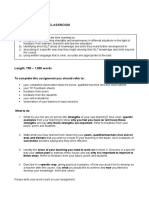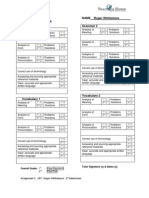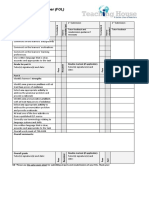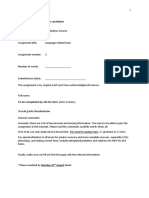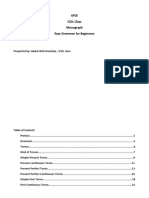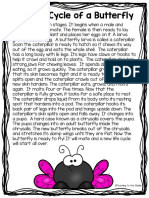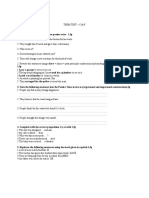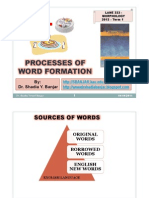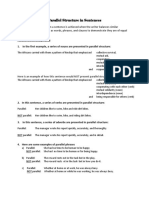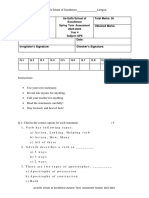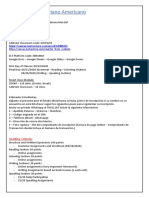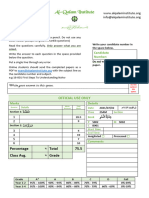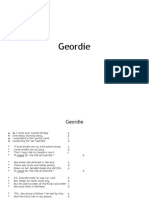A Sample of Assignmnet 1
A Sample of Assignmnet 1
Uploaded by
aya osamaCopyright:
Available Formats
A Sample of Assignmnet 1
A Sample of Assignmnet 1
Uploaded by
aya osamaOriginal Title
Copyright
Available Formats
Share this document
Did you find this document useful?
Is this content inappropriate?
Copyright:
Available Formats
A Sample of Assignmnet 1
A Sample of Assignmnet 1
Uploaded by
aya osamaCopyright:
Available Formats
1. .... and a 60-year- old person has spent almost twenty years asleep.
(grammar)
Meaning
has spent in this grammar structure means that something happened a number of times in an unfinished period
in the past and continued up to now.
Concept Checking Questions (CCQs)
1. Did the action start in the past? Yes
2. Is a person asleep now? No
3. Did it happen once or many times? Many times
4. Is there a definite time in the past? No
Form
1. Have/ has + past participle
has + spent
2. has is an auxiliary verb used with the third person singular.
past now ? Future
Pronunciation
•
has spent /həzˈspent/
1. Assimilation: /s/ to /z/ as it is preceded by a voiced sound/ə/
2. Weak form has /həz/
3. Ssentence stress is on the content word spent
4. Elision /s/ sound in spent due to consonant cluster /həzˈpent/
Anticipated Problems and Solutions
1. Problem: Students may neglect 3rd person singular form of have.
Solution: elicit 3rd person pronouns, record it on the board, elicit other pronouns for 3rd person
singular, put it on the board next to has. Drill.
2. Problem: Students may place equal stress on both an auxiliary and a main verb.
Ex ..... has spent */hæz spent/
Solution: elicit and mark the weak form on the board. Model and drill.
3. Problem: Students may use (has spends) using the - final (s) form of the verb instead of the past
Participle.
Solution: Elicit the correct form of the verb. cross out the - final (s) form on the board and write the past
participle above the correction.
2. ..... the unpleasant symptoms we suffer.
Meaning:
- symptoms: a change in your body or mind that shows that you are not healthy which include, a headache and
sore throat.
- Unpleasant: not pleasant or comfortable.
Concept Checking Questions (CCQs):
1. Do we feel well? No.
2. Is there a change in your body that tells you are ill? yes
3. Are these feelings pleasant? (No)
4. Do you have to see a doctor? (yes)
Form
1. Attributive Adjective (not good connotation) + noun (countable plural)
2. unpleasant + symptoms
3. Noun phrase (determiner + adjective + noun)
i. The + unpleasant + symptoms
Pronunciation
1. Unpleasant symptoms /ʌnˈpleznt ˈsɪmptəms/
2. Assimilation: /n/ to /m/ and /s/ to /z/-/ʌmˈpleznt ˈsɪmptəms/
3. Sentence stress is on unpleasant symptoms.
Appropriacy
formal, can be used in all kinds of speaking and writing situations.
Anticipated problems and solutions
1. problem: Students may pronounce the (s) in unpleasant /s/ instead of /z/.
Solution: elicit and mark the /z/ on the board. Model and drill.
2. Problem: Students may place equal stress on both words rather than place the stress on the first word.
3. e.g ... the unpleasant symptoms we suffer
Solution: Elicit and mark the stress on the board. Model and drill.
4. Problem: Students may get confused with the meaning of the word symptoms.
Solutions: use the CCQs and give examples (cough, fever, flu, sore throat)
You might also like
- Assignment 2 - LRTDocument7 pagesAssignment 2 - LRTVan Le100% (2)
- Gateway to Arabic - Book Two - by Dr. Imran Hamza Alawiye - مفتاح العربيةDocument49 pagesGateway to Arabic - Book Two - by Dr. Imran Hamza Alawiye - مفتاح العربيةMountainofknowledge94% (49)
- CELTA Online Unit 2 Task 13 - Designing TasksDocument2 pagesCELTA Online Unit 2 Task 13 - Designing TasksShalindriNo ratings yet
- Focus On The LearnerDocument5 pagesFocus On The LearnerHeba MouradNo ratings yet
- Written Assignment One CELTADocument3 pagesWritten Assignment One CELTAnlr253No ratings yet
- Teaching Task - Anticipated Problems and SolutionsDocument9 pagesTeaching Task - Anticipated Problems and SolutionsCarolinaNo ratings yet
- Celta: Assignment 3: Skills-Related: Part 2: Receptive Skill Task DesignDocument3 pagesCelta: Assignment 3: Skills-Related: Part 2: Receptive Skill Task DesignBasma Elzeidy100% (1)
- Assignment 2 - Maria - Marked PDFDocument10 pagesAssignment 2 - Maria - Marked PDFMaria AvilovaNo ratings yet
- Language Related Tasks Assignment C6 2017Document2 pagesLanguage Related Tasks Assignment C6 2017Imran Rahim0% (2)
- Celta Assignment 4-FinalDocument3 pagesCelta Assignment 4-FinalAlejandro Núñez0% (1)
- Assignment 2 Siwar - 2020Document14 pagesAssignment 2 Siwar - 2020Siwar Bdioui100% (1)
- Assignment 3 - LSRT Skills E - TippingDocument8 pagesAssignment 3 - LSRT Skills E - Tippingbrentcullen50% (2)
- CELTA Assignment 2 Feedback Language RelDocument9 pagesCELTA Assignment 2 Feedback Language RelRania MohammedNo ratings yet
- Ass2-Language Related TaskDocument29 pagesAss2-Language Related TaskГалина Рогожина50% (2)
- LRT Celta Part CDocument1 pageLRT Celta Part Csandra vujicNo ratings yet
- CELTA Assignment 3 SkillsDocument16 pagesCELTA Assignment 3 SkillsMARCELA100% (1)
- Assignment 2 - Language Analysis and MeaningDocument9 pagesAssignment 2 - Language Analysis and MeaningShelia83% (6)
- Lesson Plan Tp4 Looks LikeDocument4 pagesLesson Plan Tp4 Looks Likeprajjwal.aricent4122No ratings yet
- Victor Slonzon Piedade UNIT 2 Task 13Document3 pagesVictor Slonzon Piedade UNIT 2 Task 13Victor PiedadeNo ratings yet
- Celta Course Lesson Plan: ListeningDocument5 pagesCelta Course Lesson Plan: ListeningLina Lily0% (1)
- Assignment 3 Language Skills Related TasksDocument2 pagesAssignment 3 Language Skills Related Taskssweetlankka0% (2)
- Assignment 2 Answer SheetDocument8 pagesAssignment 2 Answer SheetRaghdah AL-Madany100% (1)
- Lesson Plan Letter PDocument2 pagesLesson Plan Letter Paya osamaNo ratings yet
- Written Assignment 2: Language Related Tasks: Example 2 in The Example Answers Below The Text)Document5 pagesWritten Assignment 2: Language Related Tasks: Example 2 in The Example Answers Below The Text)Maria AvilovaNo ratings yet
- CELTA Written Assignment: Focus On The Learner-EXAMPLEDocument4 pagesCELTA Written Assignment: Focus On The Learner-EXAMPLEClara Maria Quispe CéspedesNo ratings yet
- Cederholm Celta Lesson Plan6Document10 pagesCederholm Celta Lesson Plan6Logan RunNo ratings yet
- Error Analysis - Simple Past Tense (ENG 653)Document8 pagesError Analysis - Simple Past Tense (ENG 653)Rave FonNo ratings yet
- Celta TP2Document7 pagesCelta TP2Doğa Erkan DozzoNo ratings yet
- Focus On The Learner: CELTA - Written Assignment 1Document6 pagesFocus On The Learner: CELTA - Written Assignment 1Letícia IglesiasNo ratings yet
- Assignment Language Related TaskDocument9 pagesAssignment Language Related Taskaya osamaNo ratings yet
- CELTA Online Unit 8 Task 11-3 - Your TurnDocument3 pagesCELTA Online Unit 8 Task 11-3 - Your TurnMaria AvilovaNo ratings yet
- CELTA Assignment 4 LFCDocument4 pagesCELTA Assignment 4 LFCLucy MingNo ratings yet
- Assignment 1 - LRTDocument5 pagesAssignment 1 - LRTSinzi SocolNo ratings yet
- Assignment 1 - FOTL - 20200101Document7 pagesAssignment 1 - FOTL - 20200101lalaNo ratings yet
- Assignment 1 CELTADocument5 pagesAssignment 1 CELTAvligrNo ratings yet
- Celta Assignment SampleDocument3 pagesCelta Assignment SampleСветлана Кузнецова100% (1)
- CELTA Assignment 4 - InstructionsDocument1 pageCELTA Assignment 4 - InstructionsGeorge_Panayio_89490% (1)
- CELTA Lesson PlanDocument8 pagesCELTA Lesson PlanKateNo ratings yet
- 4 TH AssignmentDocument5 pages4 TH AssignmentWagner Felix0% (1)
- CELTA Assignment 4Document7 pagesCELTA Assignment 4hninwutyeeoothestudentNo ratings yet
- CELTA Language Related Assignment (New)Document8 pagesCELTA Language Related Assignment (New)Khalid MehmoodNo ratings yet
- Assignment 4 Lessons From The ClassroomDocument1 pageAssignment 4 Lessons From The Classroomsweetlankka0% (1)
- Assignment 4 LFCDocument3 pagesAssignment 4 LFCSarshNo ratings yet
- Richard's TP 4Document6 pagesRichard's TP 4R BNo ratings yet
- Assignment 2 - Language Related Tasks - 2Document2 pagesAssignment 2 - Language Related Tasks - 2SamNo ratings yet
- RPL Assignment 1 DraftDocument6 pagesRPL Assignment 1 Draftrusiru_chitrasena7478No ratings yet
- A1 Language Related TaskDocument9 pagesA1 Language Related TaskRoger WhittemoreNo ratings yet
- Final TP5Document4 pagesFinal TP5SapnaDileeshNo ratings yet
- Authentic Materials AssignmentDocument3 pagesAuthentic Materials AssignmentVicki Jade Stevenson100% (1)
- Celta Assignment No.2Document3 pagesCelta Assignment No.2Kiss Kinga100% (2)
- Ass 3 Alan PASSDocument7 pagesAss 3 Alan PASSmutiso mutie100% (1)
- Assignment 1-Celta Focus On LearnerDocument4 pagesAssignment 1-Celta Focus On LearnerMarsha N100% (1)
- FOL ExampleDocument13 pagesFOL ExampleQingqing LuNo ratings yet
- Assignment 1 - FOLDocument7 pagesAssignment 1 - FOLVan LeNo ratings yet
- Assignment 3 SathyaDocument10 pagesAssignment 3 SathyaSathya HarikumarNo ratings yet
- Celta AssignmentDocument13 pagesCelta Assignmentshilpadub100% (2)
- Armando Aguilar LRT1Document9 pagesArmando Aguilar LRT1Armando LunaNo ratings yet
- Focus On The LearnerDocument7 pagesFocus On The LearnerDiana Graur100% (2)
- LRT FinalDocument28 pagesLRT FinalÆrikïrÆKǎwǎè100% (2)
- CELTA Assignment 2 Language Related TaskDocument5 pagesCELTA Assignment 2 Language Related TaskMy worldNo ratings yet
- Language AnalysisDocument13 pagesLanguage AnalysisMuhammad Iqbal100% (4)
- Project Monograph Abdul Wali DanishjoDocument23 pagesProject Monograph Abdul Wali DanishjoWali RahyaabNo ratings yet
- The Life Cycle of A Butterfly: ©teaching To The MiddleDocument11 pagesThe Life Cycle of A Butterfly: ©teaching To The Middleaya osamaNo ratings yet
- KG1/ Math Journal: Remarks Date Pages TopicDocument64 pagesKG1/ Math Journal: Remarks Date Pages Topicaya osamaNo ratings yet
- Citation Luc11 /L 1033Document4 pagesCitation Luc11 /L 1033aya osamaNo ratings yet
- Reflective Essay: Prepared By: Aya Osama Ahmed Abdel LatifDocument2 pagesReflective Essay: Prepared By: Aya Osama Ahmed Abdel Latifaya osamaNo ratings yet
- International Journal of Applied Linguistics & English LiteratureDocument11 pagesInternational Journal of Applied Linguistics & English Literatureaya osamaNo ratings yet
- Day: Date: Subject: English Topic: Letter PP Class: Sessions: 3 Specification: Whole Class Class Duration: 2 HoursDocument3 pagesDay: Date: Subject: English Topic: Letter PP Class: Sessions: 3 Specification: Whole Class Class Duration: 2 Hoursaya osamaNo ratings yet
- Assignment Language Related TaskDocument9 pagesAssignment Language Related Taskaya osamaNo ratings yet
- Part 1: Grammar: MeaningDocument7 pagesPart 1: Grammar: Meaningaya osamaNo ratings yet
- Passive VoiceDocument3 pagesPassive VoiceBel KisNo ratings yet
- Phrasal Verbs 1-3Document3 pagesPhrasal Verbs 1-3ali_nusNo ratings yet
- Two Word VerbsDocument6 pagesTwo Word VerbsTruong le XuanNo ratings yet
- TENSESDocument34 pagesTENSESLalu FahrurroziNo ratings yet
- Processes of Word Formation - Morphology-Lane 333-2012 - Dr. ShadiaDocument27 pagesProcesses of Word Formation - Morphology-Lane 333-2012 - Dr. ShadiaDr. Shadia100% (1)
- Parallel Structure in SentencesDocument2 pagesParallel Structure in SentencesAwais TareqNo ratings yet
- Sol Elem Progresstest 2aDocument2 pagesSol Elem Progresstest 2airene AvellanedaNo ratings yet
- A Guide To Digital SAT Grammar and Punctuation - Test InnovatorsDocument30 pagesA Guide To Digital SAT Grammar and Punctuation - Test InnovatorsEdefo Izogie-EgheNo ratings yet
- Reg 8 Simple PastDocument3 pagesReg 8 Simple PastSilvia Helena SandersNo ratings yet
- Spring GPS AssessmentDocument8 pagesSpring GPS Assessmentkrititaneja121No ratings yet
- German Subjunctive I, IIDocument6 pagesGerman Subjunctive I, IIYasar YasarlarNo ratings yet
- (Redo) There's A Rule For ThatDocument14 pages(Redo) There's A Rule For ThatZoe ThomasNo ratings yet
- Co-Ordinating ConjuctionDocument8 pagesCo-Ordinating Conjuctionsheikhmahbub67No ratings yet
- Detailed Lesson Plan in English: I. ObjectivesDocument5 pagesDetailed Lesson Plan in English: I. ObjectivesChonarene LalunaNo ratings yet
- Prefixes and SuffixesDocument4 pagesPrefixes and SuffixesEva IsusquizaNo ratings yet
- Simple Present ExercisesDocument2 pagesSimple Present ExercisesLuís MendesNo ratings yet
- ILEC Exam Report May 2006Document28 pagesILEC Exam Report May 2006Daniela OliviaNo ratings yet
- Error AnalysisDocument10 pagesError AnalysisRiaz Hussain Soomro100% (1)
- GrammarDocument5 pagesGrammarmoazNo ratings yet
- PDF1-Present Tense (Complete) : Chapter - Tenses (Notes)Document6 pagesPDF1-Present Tense (Complete) : Chapter - Tenses (Notes)Rumaysa -No ratings yet
- Quest For The Exam 2do Trimestre2do BachDocument3 pagesQuest For The Exam 2do Trimestre2do Bachlisseth carboNo ratings yet
- Morphological Typology IDocument6 pagesMorphological Typology IKoray Nedim ÖzdemirNo ratings yet
- Centro Boliviano Americano: Grading CriteriaDocument33 pagesCentro Boliviano Americano: Grading CriteriaJosue Padilla EscuderoNo ratings yet
- Hidayatun Nahw Introduction-Unit 1 (2021 Full Time) - 1Document6 pagesHidayatun Nahw Introduction-Unit 1 (2021 Full Time) - 1Humaid ShaquilNo ratings yet
- SentencesDocument15 pagesSentencesvalerie.blaisNo ratings yet
- English Rules Whoever VS WhomeverDocument6 pagesEnglish Rules Whoever VS WhomeverHectorDiazNo ratings yet
- Grammar Crammer Pronouns - 230316 - 141246Document14 pagesGrammar Crammer Pronouns - 230316 - 141246Nohemy VásquezNo ratings yet
- Syntax DasDocument32 pagesSyntax DasVirgi TheRocketmanNo ratings yet
- A Very Popular Ballad GeordieDocument11 pagesA Very Popular Ballad GeordieMaria ChiomaTntNo ratings yet

















